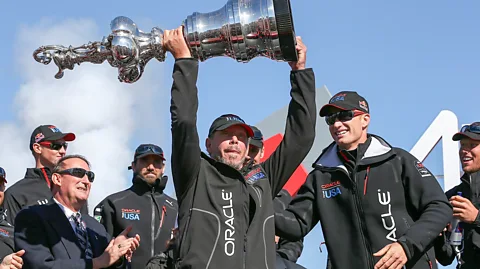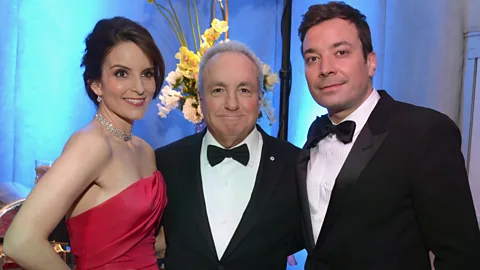Three traits that will get you hired by the best bosses
 Alamy
AlamyThere’s a secret of success that even the best business and career books rarely mention.
But if you’ve paid attention to the movers and shakers in your industry, you might have noticed that a surprising number of those headliners will have worked for the same person. Those who haven’t will very often have worked for someone who did.
I call these managers superbosses, exceptional leaders who help other people accomplish more than they ever thought possible. They’re those special bosses everyone wants — even before they became renown — the kind that open the door to new opportunities that can’t help but accelerate your career. I’m talking about innovative leaders like Ralph Lauren in US fashion, Archie Norman in UK retail, and Ravi Venkatesan in Indian banking and technology. But I am also talking about the people in your field — middle or senior managers — who seem to be connected to peers who’ve been more successful than most others.
 Justin Sullivan/Getty Images
Justin Sullivan/Getty ImagesThink about it for a moment. Once you’ve got the name of your field’s magic-maker in your head, you’ll quickly realise it’s everywhere. A large portion of the stars in the industry will have the magic name on their CV. The name will be mentioned with a strange mixture of familiarity and awe. People will refer to this superboss in passing, treating others as though they have failed a little test if they don’t recognise the reference. Shared anecdotes, first-hand or even second-hand, become something to bond over.
Gradually, you will realise that contact with this person, especially working for him or her, seems to put people on a fast track to success. Log some time and you’re likely to go places, too. If you don’t you will be forever at a disadvantage compared to those who were close to him.
Superbosses may come from different industries, and different countries, but to a remarkable extent they are all looking for the same thing when it comes to hiring. How do you match up?
The first must-have trait
One thing that virtually all superbosses look for is unusual intelligence.
Norman Brinker believed that the most important part of running a restaurant chain was hiring the smartest possible people. Style icon Lauren looked for a kind of “fashion intelligence.” He wanted everyone who worked for him, even in the most menial roles, to have a fashion sense and be able to say interesting things about clothes.
 Jason Kempin/Getty Images
Jason Kempin/Getty ImagesLorne Michaels, creator of Saturday Night Live, has a rule that he repeats all the time: “If you look around the room and you’re the smartest person in the room, you’re in the wrong room. You know, if you look around the room and you think, ‘God, these people are amazing’, then you’re probably in the right room.”
Virtually all superbosses place an emphasis on having everyone around them be as smart as possible, and they suss this out not only through interviews but by also observing people closely during on-the-job trial periods.
The second must-have trait
A second attribute that will make a superboss pay attention is creativity.
Superbosses are not looking for employees who think the same way they do. They are looking for employees who, like them, can tackle problems originally and differently. Even more, superbosses are looking for employees who can actually get somewhere with an original line of thought, who can creatively apply what they know.
When superbosses talk with prospective employees, they want, more than anything else, to hear how they think. This is why superbosses as diverse as Brinker, Larry Ellison and Roger Corman were known to listen intently when talking with job candidates, expecting to learn something new themselves.
When former employees describe the hiring practices of superbosses, the emphasis on creativity may take many forms, but it is often overt. Lee Clow, one of advertising mogul Jay Chiat’s closest associates, emphasized that Chiat “didn’t hire off the conventional portfolio/resume—he looked for people who did things creatively”.
Clow, the co-creator of the famous 1984 ad that introduced Apple’s Macintosh computer during the US National Football League’s Super Bowl XVIII telecast, was himself an illustration of this principle. He landed his job with Chiat’s firm by carrying out an eccentric, yet highly creative, ad campaign devoted entirely to the proposition that Chiat should hire him. He created slogans and designs, had bumper stickers and T-shirts made, used mailings and phone calls, and kept bombarding Chiat’s firm with his message until they put him on payroll.
It wouldn’t have worked if the ad campaign hadn’t also demonstrated considerable quality. But the real differentiator was the emphasis on creativity.
The third must-have trait
The third key thing superbosses look for is extreme flexibility.
Although superbosses often hire people with special areas of expertise, they are not usually interested in specialists who can only do one thing. They want a kind of brilliance that can be applied to many sorts of problems.
Brinker, for instance, thought that talented people should be able to handle any position. One of his associates used a sports metaphor to describe his attitude: “Norman wasn’t a fan of hiring people to play first base, for example; he just wanted to hire a good baseball player.”
Although American newspaper editor Gene Roberts helped employees build expertise in specific niches, he believed that every reporter and columnist who worked for him should be able to cover any breaking news story, regardless of the subject.
 Alamy
AlamyTo underscore their appreciation for flexibility, superbosses frequently assign new hires jobs that have little to do with their previous experience and qualifications. Roberts was known to take someone who had been processing comic strips and make him a feature writer, or to assign a sportswriter to cover politics.
Bill Sanders, the real-estate financier and founder of Security Capital, would regularly move people to different jobs in different parts of his company. And film producer Corman regularly filled the positions needed for film productions with people he had hired for completely different jobs. Actor Jack Nicholson, for example, worked for Corman as a writer and as a director.
The determination of superbosses to recruit the most intelligent, creative, and flexible employees possible is central to how they think about talent, and success. Hitching a ride with a superboss can be a game changer in your career. Now you know what it’ll take to get into that game.
Sydney Finkelstein is the Steven Roth Professor of Management and Director of The Leadership Center at the Tuck School of Business at Dartmouth College. His new book is Superbosses: How Exceptional Leaders Manage the Flow of Talent (Portfolio/Penguin, 2016). You can learn more at www.superbosses.com.
